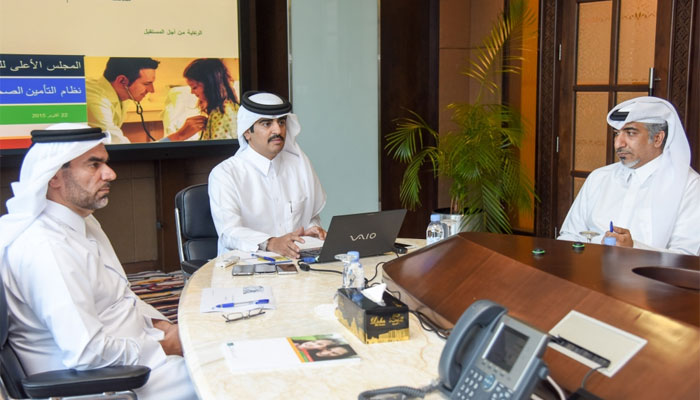QNA/Doha
The third and last phase of the Social Medical Insurance Scheme (Seha) which will include all residents comprising employees, workers, domestic helpers and visitors, will start in 2016, the Minister of Public Health HE Abdullah bin Khalid al-Qahtani has said.
However, he said "adding workers to the third phase will coincide with the opening of new hospitals planned for single workers next year".
Speaking about health insurance for expatriates, HE the Minister said employers will pay the cost of insurance for their staff and the premium will not be deducted from their salaries.
There will be separate insurance packages for different segments of expatriates, "for example, the insurance package for personnel will differ from workers and from domestic workers," Qatar News Agency quoted the minister as saying. The insurance for visitors will cover emergency services only.
The first phase of Seha, launched in July 2013, included Qatari females aged 12 and above. The second phase launched on April 30, 2014 included all Qatari citizens.
Addressing a joint press conference with acting CEO of the National Health Insurance Company Dr. Faleh Hussein, HE the minister said Seha has paid QR1.285bn until 21 October, 2015.
HE the minister refuted recent reports that the total invoices received by the company from the private healthcare sector amounted to QR10 bn.
He said there were strict controls in place to ensure that the National Health Insurance Company was not defrauded by service providers by submitting inflated invoices.
He revealed that the company has refused to pay invoices amounting to QR 317 mn from the private health sector since the introduction of the scheme "while the amount of recoverable funds totaled QR103 mn".
Among the "unhealthy practices" by service providers are "unjustified repeated visits and the unnecessary assignment to other disciplines". To prevent malpractices, "there is also a detailed and manual audit for all the claims made by the service providers, as well as checking on medical files".
About cases of fraud and forgery , HE the minister said two residents had recently been arrested for using citizens' identity cards for treatment in private hospitals under the health insurance system. A clinic was suspended from providing services after it was found that it submitted false invoices and QR5 mn had been recovered from it, the minister said.
He said the National Health Insurance Company, in cooperation with the Supreme Council of Health, has established a consultative committee consisting of doctors from both the public and private sectors for a second medical opinion.
HE al-Qahtani underlined that the health insurance system was aimed at containing costs, reducing the burden on the public health sector and giving an opportunity to the private sector for growth. "It was also aimed at giving the residents an opportunity to choose a service provider, thus enhancing competition among suppliers to improve the quality of health services."
Concerning charges , HE the Minister said the cost of treatment for each disease is fixed according to a package and all hospitals and clinics affiliated to the insurance system offered the services at the same price. "Therefore the bills cannot be manipulated as each package of treatment or illness has a specific price in advance."
Dr. Faleh Hussein, who is also Assistant Secretary General for Policy Affairs at the Supreme Council of Health, said that if it was proved that a hospital had provided "wrong treatment", it has to return the charge to the Health Insurance Company.
He noted that the audit system in the company was very strict where bills were subject to audit before and after payment. He also agreed there were some cases of fraud.
He added that costs applied by the company were defined by the Supreme Council of Health and not by the service providers. The price schedule was prepared by two independent advisory bodies that are recognised internationally.
"The prices are being revised periodically in coordination with the Supreme Council of Health on the basis of the data received through the claims and expectations and changes in the prices of services in the sector in order to achieve a fair price for all parties," Dr Hussein added.

Minister of Public Health HE Abdullah bin Khalid al-Qahtani and SCH officials at the press conference
